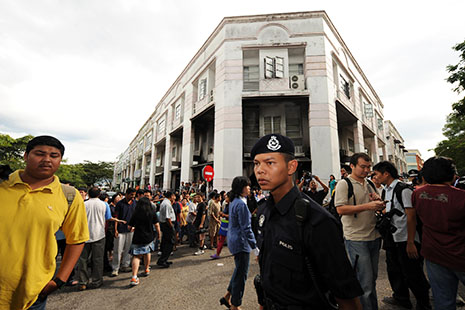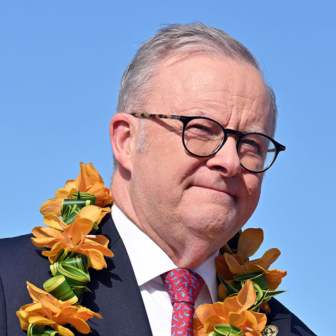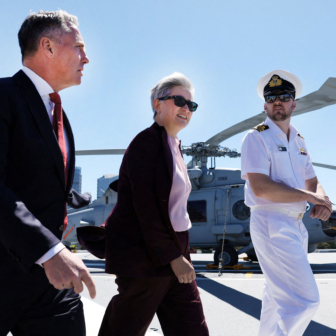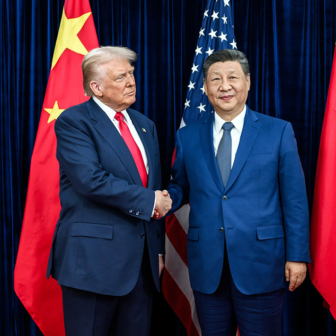THE GROUND FLOOR of a three-storey building on a busy corner stands gutted by fire, as cars and pedestrians stream by. Inside, burnt-out computers and monitors lie surrounded by shards of broken glass and concrete, blackened by smoke. Outside, police find a spanner, a kerosene container and two scorched motorcycle helmets.
This is the Assemblies of God Metro Tabernacle in the shopping precinct of Desa Melawati, a suburb on Kuala Lumpur’s northern fringe. Arsonists attacked its offices, breaking the ground floor windows at midnight on 8 January and throwing molotov cocktails inside the building. Witnesses reported four men, riding together on two motorbikes, speeding from the scene.
Two other attacks on churches took place in the early darkness that morning. A fourth happened in broad daylight, during peak hour. Since then, Malaysia has experienced a wave of arson and vandalism attempts on churches around the country, raising fears that illiberal members of the majority Muslim community are threatening non-Muslims’ right to worship freely.
The arson attempts followed the conclusion last month of a two-year case before the High Court in the federal jurisdiction of Kuala Lumpur. The court had been asked to decide whether the Malaysian government could prevent non-Muslims from using the term “Allah” to describe God in religious texts and proceedings in the Malay language.
The dispute first arose two years ago, when the Home Ministry, responsible to then prime minister Abdullah Badawi, banned the Herald, a weekly Catholic newspaper, from using the term in its Malay-language supplement. The ministry argued that if non-Muslim communities used the term it could “confuse” Muslims, giving rise to a controversy that would surely threaten national security.
Catholic Archbishop Murphy Pakiam challenged the order, and on 31 December Justice Lau Bee Lan ruled that the ban was “illegal, null and void.” Lau ruled that the government had failed to prove the security risk, and that freedom of religion and of speech are guaranteed by the Malaysian constitution. A week later the Home Ministry granted the Herald a permit to continue publishing, on the condition that the newspaper print a RESTRICTED label on its front cover to indicate that only Christians should buy it.
Only one of the firebombs that came in response to the decision caused any damage. But the fact that they occurred on that Friday morning was significant. A few hours later, a coalition of thirty-eight Islamic non-government organisations held protests at three mosques after Friday prayers, with the largest taking place at the National Mosque in central Kuala Lumpur. This was not a spontaneous outpouring of anger: organisers coordinated their action using walkie-talkies, and hung their banners – “Allah for Muslims only” – from media-friendly vantage points.
This claim to exclusive use of the term is unique to Malaysia. “Allah,” or “the God” in the Arabic language, is not only used by Muslims – it is also used around the world by Arabic-speaking Christians and Jews, members of the other Abrahamic faiths. In Malaysia, the practice was borrowed from the Arabic language; Malay-speaking Christian communities in Malaysia’s Bornean states, Sabah and Sarawak, have long used the term without attracting controversy.
So why is this debate occurring only in Malaysia – and generating most heat in peninsular Malaysia? Why not in other places where Muslims live alongside Christians and other non-Muslims? The controversy has little to do with beliefs and practices intrinsic to Islam and much to do with Malaysian political circumstances, some longstanding and some quite recent.
The most significant development in Malaysian public debate since the 1980s has been the fusion of Islamist political rhetoric and tactics with the language and practices of Malay nationalism. As a result, a new Islamist nationalism has come to dominate political life in this multi-ethnic and multi-religious society. This nationalism builds on the conflation of “the Malay community” with “the Muslim community” in the Malaysian constitution, which states that Malays are Muslim by definition. For the Malaysian government – the National Front coalition, dominated by a Malay nationalist party – this conflation has been a means of bolstering support since it came to power after independence from Britain in 1957.
Islamist nationalism is also central to the demands made by the growing number of non-government organisations that argue the government’s line while competing with the government for the political space it occupies. Members of these Islamist nationalist groups often have excellent access to government figures and members of the ruling party.
But there is a growing problem for the government and its supporters. As the results of the 2008 election showed, Malay-Muslim voters have grown less interested in this brand of identity politics. Many are more greatly concerned by the recession, corruption, low incomes and a perceived lack of opportunity – and significantly, these issues cut across ethnicity and religion. As a result, opposition parties won a higher percentage of seats in 2008 than in any previous election since 1969. Those parties, currently united in the People’s Alliance, led by former deputy prime minister Anwar Ibrahim, campaigned on a multi-ethnic platform.
One such party, the Pan-Malaysian Islamic Party, or PAS, has achieved a remarkable reversal in Malaysian politics by defending non-Muslims’ right to use “Allah.” It can now pitch itself as the moderate Muslim party, and the government as extremists. This was unthinkable as recently as 2002, when the National Front’s campaign advertising portrayed PAS as the Taliban and argued that only the National Front could protect religious freedom.
Against this background, the logic of the Malay/Muslim conflation for the government and its supporters is clear, and statements released by some of the NGOs responsible for the Friday protests sought to reinforce the message. The Malay-language website of the student-centred Alliance of Malaysian Muslims, or ISMA, argues that Malaysia is unique in the Muslim world, and must not be compared with other countries in which non-Muslims use “Allah.” In Malaysia, the Malay ethnic group is “synonymous” with Islam. Therefore, if Malay dignity is threatened, Islam’s dignity is also directly threatened. According to ISMA, the struggle for Malay rights is not only a struggle for ethno-national expression, but a struggle for Islam itself.
Another article makes the argument in reverse. In Malaysia’s case, it says, the use of “Allah” could spread beyond Christians to describe idols and animals, whose association with God is expressly forbidden by Islam. Here, ISMA is referring to Buddhists and Hindus, the nation’s largest religious minorities, whose beliefs reference “idols” and animals. But these communities use other names to describe deities and spirits, and are not likely to abandon them for “Allah.” Nevertheless, the ISMA article posed the following question: given the anger triggered by the 2005 Danish cartoons of the Prophet Muhammad, what could happen if an idol with an animal’s head, carrying the name “Allah,” were circulated in Malaysia?
The bulk of Malaysia’s Buddhists and Hindus are ethnic Chinese and Indians, Malaysia’s largest non-Malay communities. Arguments like those used by ISMA seem designed to draw an ethnic as well as a religious boundary between Malaysia’s Muslims and non-Muslims. And insinuating that Malay-Muslims could commit violence against provocative minority communities draws on a longstanding theme in Malaysian politics, invoking the anti-Chinese riots of May 1969.
The message that people could be killed was reinforced by a hacker called “Brainwash,” who replaced text on the Malaysian Judiciary’s website with statements including “Allah restricted to Muslim only” and “Mess with the best, die like the rest.” After the recent firebombs, text messages circulated rumours of organised car-smashings and urged Christians to remove the religious identifiers that are often displayed on the back windows of cars in Malaysia.
SINCE 8 JANUARY, another six churches have been firebombed or vandalised, bringing the total to ten. No more have suffered any serious damage. The “Allah” debate, however, has not yet played itself out. It will certainly be kept alive for some time, bringing the possibility of more property damage, and more threats of violence.
Two legal battles over “Allah” have already been scheduled for the coming months. The government has announced it will appeal the High Court decision, which it argues is “wrong.” Nazri Aziz, a minister in the prime minister’s department under the current prime minister, Najib Razak, has argued the Catholic Church is “looking for trouble” by using the term.
In another upcoming case, a Christian woman, Jill Ireland, will challenge a Home Ministry decision last year to confiscate Christian compact discs referring to “Allah” which she had in her luggage when she returned to Malaysia from Indonesia. Ireland insists the CDs, bearing titles such as “How to Use the Key to God’s Kingdom,” were for her personal use. Proselytising to Muslims by members of other faiths is prohibited by the constitution.
The Indonesian origin of the CDs is not incidental, and highlights the differences between Christian communities in Malaysia’s peninsular and Bornean states. Christian worship in peninsular Malaysia is very often conducted in English, or in Chinese or Indian languages, reflecting the linguistic preference of the congregation. Ireland, however, is a member of the indigenous Melanau group in Sarawak, so it is not surprising that she would buy Malay-language Christian CDs in Indonesia.
In fact, indigenous groups in Sabah and Sarawak form practically the only Christian congregations in Malaysia which worship in Malay. To meet congregations’ needs, Christian texts in the Malay language are often imported from Indonesia, all containing the term “Allah.” For more than a century, such texts have been central to the activity of the Evangelical Church of Borneo, which has 250,000 members in the Bornean states (and only 10,000 in peninsular Malaysia).
Only a single Bornean church has had its windows smashed – the Anglican Good Shepherd Church in Miri, a petroleum, timber and oil palm port facing the South China Sea in Sarawak. All the other vandalised churches are on the peninsula. The likelihood that none of them use “Allah” in worship is clearly not important to their attackers.
Indonesian Muslim groups like the Nahdlatul Ulama and Muhammadiyah have urged their members to refrain from copycat attacks. But comparisons with Christian and Muslim practices in Indonesia are unacceptable to the Malaysian government. Briefing foreign journalists on 11 January, the secretary-general of the Home Ministry, Mahmood Adam, argued that “Malays here are different from [Muslims in] other countries. The landscape here is different from Indonesia so we can’t compare.”
Emboldened by the government’s statements, some NGOs are preparing for a long campaign, extended by the upcoming court cases. The government has also defended the mosque protesters’ right to demonstrate, a right it generally argues Malaysians do not possess. Speakers at the National Mosque protest spoke of “Allah” as an issue for the long term.
Perhaps it is. It has taken more than twenty years for the “Allah” ban debate to gain such prominence in Malaysian political and religious life. It was in 1986 that the Malaysian government first introduced legislation preventing non-Muslims from using the term. The ban has not previously been enforced, however, and Malay-speaking Christians have continued to use “Allah” without incident.
The recent revival of the ban has also revived the issue of potential Muslim confusion. The problem, as argued by supporters of the ban, is that using “Allah” for the Christian Holy Trinity, in which Jesus Christ is held to be the Son of God, contradicts the term’s Islamic sense, in which the absolute indivisible unity of God (tawhid) is a fundamental tenet. In Islam, there cannot be a trinity, or any question of God fathering a child.
The government also banned non-Muslims from using the terms “solat” (obligatory formal prayers), “kaaba” (the sacred structure visited by Muslims performing the Haj pilgrimage in Mecca), and “baitullah” (place of worship). Nevertheless, a speaker at this month’s National Mosque protest argued it would only be a matter of time before churches were labelled “Baitullah,” further confusing Muslims.
IN THE LEAD-UP to the next Malaysian election, and disconcerted by the opposition’s previous gains, the government is acutely aware that it has relied on “Malay unity” to keep its electoral majority. This is why the National Front parties, the government and the Islamist nationalist NGOs constantly urge Malay-Muslims to defend their common identity, arguing that minorities are different from them and threaten their interests.
In case anyone should forget these purported differences, or become “confused” about their nature, the government and the NGOs use issues like the “Allah” question to reinforce the boundaries between the majority and the minority. As one speaker at the protest warned, “Do not cross the boundary.”
On the other side of this boundary, non-Muslim Malays are constantly reminded that the majority can be goaded into violence by their practices, and that they need the government to protect them from harm. To this end, the government has promised a crackdown. On 13 January, the home minister, Hishamuddin Tun Hussein, threatened arsonists with imprisonment under the Internal Security Act, a colonial-era ordinance which provides for preventative detention.
Using the Internal Security Act with the High Court appeal looming will strengthen the government’s argument that there is a security risk, posed by extremists who firebomb churches. It can then argue that banning the non-Muslim use of “Allah” is the way to prevent these extremists from being provoked. One NGO, Pribumi Perkasa, has already begun to assist the government’s case by calling the attacks sabotage performed by unknown parties to tarnish Islam and undermine the national economy. It has called for the Internal Security Act to be used against the perpetrators.
If this strategy works, the government will ultimately “restore” national security, detaining individuals connected to the arson. It will also ban the non-Muslim use of “Allah,” appeasing the manufactured pro-ban constituency. All sides will have been flattered or threatened into accepting the National Front, and the ethnic and religious boundary will have been reinforced.
But neither the government nor the NGOs can be sure that this move will unite its constituency. The mosque protests were small, reportedly attracting no more than 500 people in total, including bystanders, some of whom refused to join in. This modest turnout reinforces the message of the 2008 election result: that Malay identity is no longer the potent political force it once was.
This could leave the government, which only a decade ago was lauded as a moderate example to the rest of the Muslim world, under increasing criticism. Just last month, the Pew Forum, a United States think tank, ranked Malaysia the ninth most restrictive country among the 198 countries it surveyed for its 2009 Global Restrictions on Religion survey.
Since then the offices of the lawyers who defended the Herald in court have been ransacked. Internet mobilisation has begun, and 220,000 people have already joined a Facebook group protesting the court decision. And lawyers, political figures and NGO activists are preparing their statements, gearing up for the next two “Allah” court cases. •




